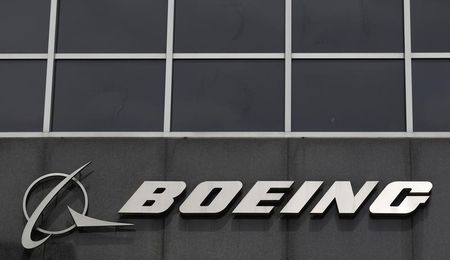By Stanley Carvalho
ABU DHABI (Reuters) - Boeing Co (N:BA) has sketched out plans to develop an all-new aircraft, with new engines and likely a composite structure, to replace its 737 MAX jetliner by 2030, Chief Executive Officer Jim McNerney said on Wednesday.
The airplane will be slightly larger than the 737 but its shape won't change dramatically from the current fuselage. The push for the new aircraft was being driven by competition from China and elsewhere, he said at an innovation summit.
"By 2030 we will have a new airplane," he said, adding there's "a good chance it will be a composite airplane."
"It will be slightly bigger, there will be new engines. The current look of the planes (shape) won't change dramatically," McNerney said.
Chinese planemaker COMAC is developing the C919 jet to compete with the 737 and the Airbus (PA:AIR) A320. The jet has been delayed until end-2015.
Other competitors include Russia's MS-21 and the slightly smaller Bombardier (TO:BBDb) CSeries from Canada.
McNerney said an all-new 737 MAX replacement was needed "because the new entrants would do something like MAX."
Boeing has nearly 100 years of aircraft experience and "we cannot give up that advantage because competing on costs alone would be difficult," he said. "Innovation is the only answer, there's no easy way around."
The Boeing 737 and competing Airbus A320, seating 150-160 people in standard layouts, are the world's most popular jets and the backbone of short-haul fleets worldwide.
Boeing had considered designing a completely new "clean-sheet" design as a successor to the 737 at the start of the decade but abandoned the plan and came up with a revamped version of the 737 known as the MAX after Airbus scored market success with an upgraded version of its own A320.
Having invested in an upgrade capable of providing around 15 percent fuel savings thanks to new engines, both companies had previously indicated they would not aim for a complete redsign before 2030.
But McNerney's comments provide further detail to the thinking of the Chicago-based aerospace and defence giant.
Boeing is preparing to deliver the 737 MAX, its next iteration of the stalwart single-aisle 737 jetliner it introduced in 1968.
The 737 MAX is a "renovation" of the current 737, with new engines and aerodynamic changes that provide up to 20 percent better fuel efficiency. But the jet is not an all-new aircraft, and the company now envisions succeeding it in 2030.
Boeing's chief executive has said the company wants to avoid "moon shots" - long-range product developments that take decades to come to market. Instead, Boeing wants to innovate frequently and harvest existing technology in new aircraft, much like tech companies do. By referring to a composite 737 structure, McNerney suggests the successor plane will draw from the composite-built 787 Dreamliner, Boeing's latest all-new aircraft.
Boeing and Airbus are battling for market share in the crucial single-aisle segment, which will account for nearly 70 percent of new aircraft deliveries worth some $2.5 trillion over the next 20 years, according to Boeing's estimates.
Boeing's 737 MAX competes with the Airbus A320neo family, which was launched about 8 months before the 737 MAX and so far has captured about 60 percent of sales.

The A320neo is due to enter service in the fourth quarter of 2015, compared with 2017 for the 737 MAX.
(Reporting by Stanley Carvalho in Abu Dhabi; Writing by Alwyn Scott; Editing by Bernadette Baum)
_800x533_L_1412520412.jpg)